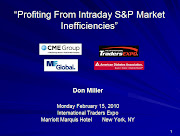 With all of the "Best of the Decade" lists being published this week, and as I make some decisions as to where to take this blog in the future, I thought I'd join the parade and provide my top personal trading lesson of the decade as we get ready to welcome in 2010.
With all of the "Best of the Decade" lists being published this week, and as I make some decisions as to where to take this blog in the future, I thought I'd join the parade and provide my top personal trading lesson of the decade as we get ready to welcome in 2010.While I could write a blog on the hundreds of lessons I learn every day (wait, I guess I've already done that), if I had to choose one lesson that's had the most dramatic impact on my trading career -- and ultimately the P&L -- discovering the magic of outliers would likely be the greatest take-away of the last decade.
For such reflects an often-illusive concept that the vast majority (who still don't "get it") fail to grasp. And by "discovering", I mean learning when they occur, stalking them, and ultimately taking action on them.
To illustrate, let's work through four scenarios, using two from the poker table and one from the trading "table":
Player 1: You're a cash game player, great at post-flop play, and choose to play almost every hand to the river Gus Hansen or Michael Mizrachi style, grinding out a consistent income over time by outplaying the other guy from start to finish enough times such that the net result provides a decent living.
Player 2: You're also a cash game player, watch all of the same hands as Player 1 does, yet instead wait patiently in the wings over a long period of time for a premium hand where you also know the "other guy" is trapped, and one time finish the hand with a straight flush when the other guy is holding quads (4 of a kind), and pretty much has to call anything you bet. And then a similar scenario happens on the very next two hands where it's clear you have the "nuts" and the other guy is -- well, screwed.
Scenario "B" (Tournament Poker):
Player 1: You're a strong tournament player, and employ a style that places you "in the money" enough times to grind out a living, as you play conservatively on occasion to ensure yourself of a paycheck.
 Player 2: You find yourself at the World Series of Poker or one of the stops on the World Poker Tour, and sense that (a) your "game" is on, (b) you have an evolving clear advantage over the remaining field, and (c) the flops are incredibly conducive to your strength and hole cards. You thus "go for the throat" and win one or two tourneys, spending other time pursuing other interests.
Player 2: You find yourself at the World Series of Poker or one of the stops on the World Poker Tour, and sense that (a) your "game" is on, (b) you have an evolving clear advantage over the remaining field, and (c) the flops are incredibly conducive to your strength and hole cards. You thus "go for the throat" and win one or two tourneys, spending other time pursuing other interests.And finally, scenario "C":
 Trader 1: You're a short-term intraday trader -- say this "young" guy in the pic to the left without any grays -- and after making it through the steep learning curve and joining the small minority of traders who consistently profit, you earn a fairly consistent $200K+ annually by essentially trading the same way day-in and day-out, grinding out your daily keep by spotting intraday market inefficiencies (the topic of my upcoming NY speech). Not a bad sum, especially in the current economy and in line with many middle- to upper-end salaries working for an "employer", and you're able to support a family of four on one income. In five years, you would have of course earned $1 Million, and in ten, $2M.
Trader 1: You're a short-term intraday trader -- say this "young" guy in the pic to the left without any grays -- and after making it through the steep learning curve and joining the small minority of traders who consistently profit, you earn a fairly consistent $200K+ annually by essentially trading the same way day-in and day-out, grinding out your daily keep by spotting intraday market inefficiencies (the topic of my upcoming NY speech). Not a bad sum, especially in the current economy and in line with many middle- to upper-end salaries working for an "employer", and you're able to support a family of four on one income. In five years, you would have of course earned $1 Million, and in ten, $2M.
Trader 2: You're also an intraday trader, and after making it through the same learning curve, you sense the combination of your trading skill reaching a peak, a market that is conducive to your strength, and the rare opportunity for a windfall profit where you can earn a decade worth of income in a tiny fraction of the time. The rest of the time, you're simply grinding it out, stalking a repeat opportunity, or pursuing other interests.
Now for the question: Who's the "better" poker player or trader in each of the scenarios??
Now for the question: Who's the "better" poker player or trader in each of the scenarios??
It's of course really somewhat of a trick question, and there may be a few flaws in the details of each scenario (yes, tourney players have to play a lot of tourneys to stumble across those sweet spots and also have to be aggressive at times). Yet the point is that there is really no right answer. For in the long run, Trader/Player 1 and Trader/Player 2 both adeptly perform a unique skillset, and both conceptually earn as much as their counterpart.
Yet I believe that while good players/traders tend to specialize in one style, those that can "morph" into the other style at appropriate times have a chance to capture that element of "freedom" that first enticed many of us to pursue this crazy business in the first place.
At my end, I tend to be the grinder, which I was almost exclusively for much of the first part of the 2000s (the young guy in the Scenario "C" pic). Yet as time went on, I learned how to morph into Player/Trader 2, especially during the last few years. For history shows that when the time was right and market emotion was as rampant as it ever was, I gunned it for all it was worth before finding, and then applying, the brakes and going back to "grind" mode -- a mode which I'm currently in.
The key in my view is to first determine your greatest strength of style and/or market condition, which will take time and vary from trader to trader. For example, on a scale of 1-10, I tend to trade volatile, emotional markets and days after trend days very, very well ... say a 9+, while I trade quieter or "drifty" markets OK, but not as well ... say a 6 or 7. On the other hand, others may excel in those "drifty" markets, as would be the case for swing traders.
The second step is then to know when such conditions exist, and the final step being simply acting on your conviction.
 A small minority still refer to my last few years as "luck" (with a career 2.4-1 win/loss dollar ratio over the last decade ... go figure), which is only unfortunate because it reveals that they're missing perhaps the key ingredient in all of trading: The concept of stalking the outlier.
A small minority still refer to my last few years as "luck" (with a career 2.4-1 win/loss dollar ratio over the last decade ... go figure), which is only unfortunate because it reveals that they're missing perhaps the key ingredient in all of trading: The concept of stalking the outlier.
The key in my view is to first determine your greatest strength of style and/or market condition, which will take time and vary from trader to trader. For example, on a scale of 1-10, I tend to trade volatile, emotional markets and days after trend days very, very well ... say a 9+, while I trade quieter or "drifty" markets OK, but not as well ... say a 6 or 7. On the other hand, others may excel in those "drifty" markets, as would be the case for swing traders.
The second step is then to know when such conditions exist, and the final step being simply acting on your conviction.
 A small minority still refer to my last few years as "luck" (with a career 2.4-1 win/loss dollar ratio over the last decade ... go figure), which is only unfortunate because it reveals that they're missing perhaps the key ingredient in all of trading: The concept of stalking the outlier.
A small minority still refer to my last few years as "luck" (with a career 2.4-1 win/loss dollar ratio over the last decade ... go figure), which is only unfortunate because it reveals that they're missing perhaps the key ingredient in all of trading: The concept of stalking the outlier.Many of the Jellies discovered this after weeks of pounding it into their brains, as I summarized in the September "Keys to the Castle" post ... which to no surprise is one of the most accessed posts of this year. And the outlier doesn't need to be a single trade. It can be those 1-2 trades a week, those 1-2 months a year, or those 1-2 years over a career where conditions exist where you can supplement the rest of the grind, or simply pursue other endeavors.
Or said another way, outliers provide you with pre-paid life options.
I don't know where this blog will go in the future.
Or said another way, outliers provide you with pre-paid life options.
I don't know where this blog will go in the future.
Yet if for some reason these end up being my final written words, they'd all be bolded in red and I'd be screaming them from the rooftop.
For in the 90s and early 00s, I learned how to trade.
For in the 90s and early 00s, I learned how to trade.
But in the late 00s, I learned how to TRADE.
May you exceed all of your trading and life goals in 2010 and beyond, and may God bless you and your families beyond your wildest dreams.
For these are my final words **.
** At least of this decade :-).
















